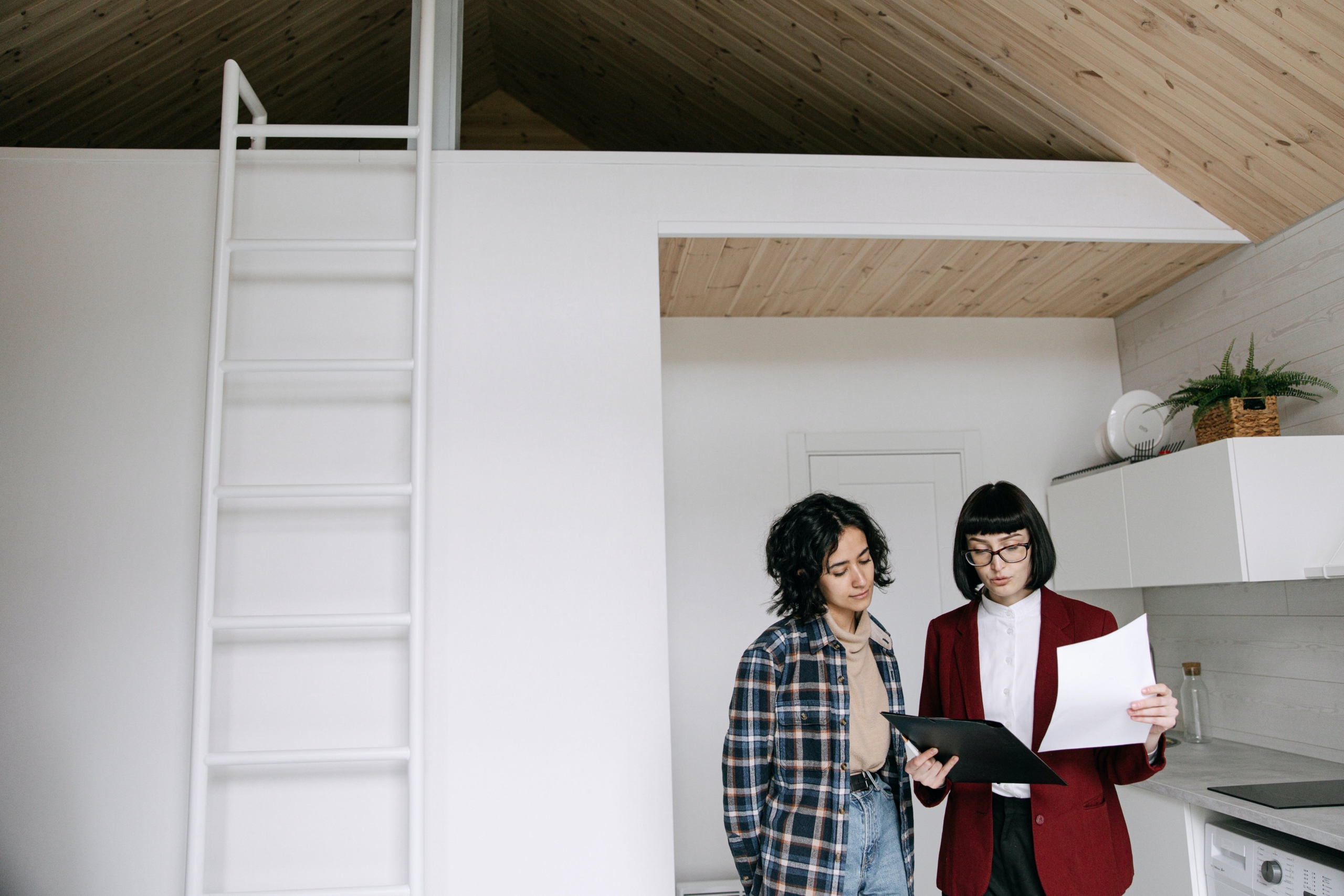Buying a house – all the important facts from the certificate of inheritance to ancillary costs
Buying a house – the dream of owning your own home, living independently within your own four walls, being able to design everything yourself and furnish it according to your individual wishes. But with these wishful thinking it is not done yet for a long time, because to a house purchase belongs much more. There is a long way to the goal of being able to lean back, relax and enjoy life in your own garden. To make this as easy as possible, here are the best tips & tricks on what you should pay attention to when buying a house and what pitfalls you can avoid.
The house purchase – broker, commission & loans
When first thinking about buying real estate, many questions immediately arise. What is the best way to proceed? Do I need a real estate agent or should I search on my own? How big should the house be, how many square meters and rooms does it need? In which area do I search and above all how much budget do I need? We will now get to the bottom of all these questions.
Learn more about buying a house at IHV!
Requirements – the way to your dream property
In the first step on the way to your dream property, you should first consider what requirements you have for your home. How many rooms do they need and how many square meters should their house and their property have in the best case? Of course, they should also be clear in which area they want to move and adjust their needs according to this scheme. A house in a city will be more expensive than a house in a suburb or in the country. Do you need a school nearby or should a supermarket be within walking distance. Do you want a garden or a child friendly environment. Of course, you should also think about the exterior of your property. Do you prefer a certain style of house, should the house be more modern or more Nordic style? After you have clarified these basic questions and know how you imagine your dream property, you can move on to step 2.
Financial planning – financing options and requirements
The financial planning takes a large part in the path to owning a home, because with construction financing and loans you enter into a large commitment that can span several decades. Accordingly, anyone who is thinking of buying a property should first check their own financial resources. This includes, for example, whether property or a building savings contract is already available and how much it is. Also should be checked which funds can actually be called in the short term. In order to obtain a loan from a bank, it is recommended to have at least 10-20% of the required sum (purchase sum and ancillary purchase costs) as equity capital. The higher the equity, the better.
Of course, personal circumstances also play a role in financial resilience. These include, for example, family planning and the desire to have children, the employment situation of the partners and, of course, marital status. You should consider whether further major financing is planned for the next few years and how this will affect your financial situation. It is also important to determine the permanent expenses in order to be able to include them in the planning. These include fixed costs such as insurance and ancillary costs, but also holidays, car purchases or provisions for financial security.
The next important point is the repayment period, as one should think about how long they want to repay and hence how long they want to be in debt. It is recommended to plan the financing in such a way that the debtors are debt free by the age of 60. However, this also depends on how high the repayment rate can be. The shorter the repayment period, the higher the repayment rate, but there are also slightly cheaper interest rates for shorter loan periods. As a rule of thumb, with a repayment rate of two percent, the repayment period is approximately thirty years.
Once these questions have been clarified, it is time to compile the documents for the banks, because they need many different documents in order to be able to apply for an offer in the first place. Such documents include monthly income, which is evidenced by the income tax assessment, as well as a list of regular expenses and current assets. Also, at this step, they should already have a purchase property and, in the best case, cost estimates, because the more accurate and comprehensive the documents they provide, the faster and better the bank can make an offer. Compare many different offers, from several credit institutions as there can be many differences and they can thus find the best offer for their project.
Search – brokers, patience and ads
There are many different ways to approach the house hunt. Of course, a real estate agent has many advantages, because he accompanies them from start to finish on their search, knows insider tips and can help them with the decision with words and deeds. If you prefer to search on your own, there are many online portals, such as ‘Immonet’ or ‘Immobilienscout24’ where you can view a large selection of properties. Let your friends and acquaintances know that you are looking for a house, because a lot can happen through contacts. When viewing a property, there are a few things you should bear in mind in order to gather as much information as possible about the property. First of all, you should only visit the property during daylight hours, as you will be able to see defects and faults much better than in artificial light. Take a close look at the surrounding area and pay attention to possible noise, smells and the parking situation. The infrastructure around the property should also be explored carefully to compare if it fits their requirements. Talking to the neighbours can also uncover helpful information.
At the property itself, they should pay attention to the condition of the facade, roof and attic, as well as the basement rooms and windows. Water stains on the walls and ceiling, outdated windows with low insulation or a leaking roof can be discovered during these observations. Take pictures and of the property and any faulty areas. Of course, the exposé already tells you a lot about the property, but not all questions will be answered here. Create a list of questions so that you can find out as much as possible about the property during the viewing. Possible questions could be for example the following:
- Do renovations or refurbishments need to be carried out?
- What is the condition of the roof and windows?
- What heating is in the property, how old is it and what insulation does the house have?
- Useful here is always the energy certificate, so ask them explicitly for this.
- The floor plan with drawing of load-bearing walls to be able to plan a possible reconstruction.
- The statement of operating costs
- Check the incidence of light and the cardinal directions, for example, to find out when the sun shines into the garden.
- Ask them the reason for the sale and the duration of the vacancy
- Do fixtures such as kitchen, cupboards, etc. remain in the house and do they have to be taken over?
- Visit different objects to create a selection and to be able to see different offers. In case of uncertainties, such as damp walls, etc., it is better to consult an expert and let him assess the whole.
Legal basics – purchase contract, land register entry & Co.
To buy a house, legal ways must also be followed and many standards must be observed. In order to do this correctly and make the house sale also right some things must be followed.
Lots of helpful tips on the legalities of selling a house!
Notarisation of a purchase contract – the notary helps with land register entry and more
The purchase contract fulfils the standard that according to § 311b BGB a notarial certification must be present if the ownership of a property or rights equivalent to real property is transferred. However, the transfer of ownership is not valid after signing and notarial certification, but only after registration in the land register.
First, a notary drew up a draft contract of sale that should suit both sides. This is fixed some time before signing so that both parties can check it. During the notarization, the notary reads the contract again and both parties can ask questions. The notary also informs about the consequences of the sale of the house and explains the further steps of the transfer of ownership.
Until registration in the land register, the buyer’s claim to the property is secured by the registration of a so-called priority notice of conveyance in the land register. This ensures that the transfer of ownership of the property can be processed safely. The transfer of ownership in the land register is only initiated by the notary when the purchase price has been transferred in full. Likewise, the tax office must confirm with a clearance certificate that the buyer has paid the real estate transfer tax. From which point in time the property is transferred to the buyer, i.e. the “economic transfer” takes place, is also determined in the notary contract. From this point on, the buyer bears all costs and is liable for the property. However, he is not the final owner until the transfer of ownership is complete and his name is entered in the land register.
Transfer of ownership – from seller to buyer
By entering into the purchase agreement, not only does ownership of a property pass to the purchaser, but the purchaser also assumes all risks, taxes and encumbrances associated with ownership of the property. This allows the new owner to do with the property as he or she sees fit. The transfer of possession is precisely defined in terms of date and is completely independent of the new owner’s entry in the land register, i.e. the transfer of ownership.
Building money & costs – what you have to pay when buying a property
After you have decided to buy your dream property, the question of the right financing arises. Here you should inform yourself about all the options, because you will have to live with the decision about financing for the next few years. Especially for inexperienced a real estate purchase is a big step, which is why you should be especially sure that you find the right offer.
Learn more about construction money!
Building money – 6 tips for successful financing
-
Tip 1 – Determine your initial situation
Before you start your search, you should determine your budget and your requirements in detail. This includes the living space, the number of rooms, the construction and equipment, the location, the architecture, the local transport and the distance to important places such as the workplace or schools. Once you are sure of your requirements, clarify your budget. How much equity can you raise? It is also important to determine what your maximum future monthly costs may be and how much you can really afford. To do this, compare your current monthly fixed costs and expenses. Once you’ve created an overview, you’ll have a rough idea of what to look for.
-
Tip 2 – Include a redemption payment
Rent and interest are real costs, but when you make a repayment, the money is used as a kind of installment savings plan. This means your loan debt goes down, but your net worth goes up. So you should also include the repayment you have to make on the loan each month in your calculations. Think of how many years you would like to have the debt paid off in and calculate with that figure. Remember that the rent you pay each month is not an investment in value, while the repayment will still increase your net worth each month.
-
Tip 3 – Compare as many offers as possible
The more listings you request and compare, the more choices you have and the more likely you are to find your dream property. Do not be afraid to search extensively and look at many properties. Search not only on property portals but also in newspaper listings, ask your friends and acquaintances and always keep your eyes open. The effort you put into your search will definitely pay off for you in the long run.
-
Tip 4 – Choose long-term financing
The important thing with long-term financing is that you secure the low interest rates for as long as possible. Preferably for the next 15 years or longer. This guarantees you a solid repayment rate. Depending on the purchase price, use 20% equity or less and choose a classic annuity loan. With this loan, the repayment should be about 2%. If this is higher, your return is also higher in the event of inflation. But if it is lower, you do not meet the certain repayment amount that you need, so that you do not get into trouble with a follow-up financing. If you also take out another loan, such as a subsidy loan, the terms must match, otherwise they can threaten early repayment penalties in the event of a sale.
-
Tip 5 – Get multiple financing quotes
Of course, the easiest and simplest way is to simply take out the loan at the house bank and handle the financing through it. However, there are big differences in the financing offers from different banks. For this reason, you should get at least two different offers, if not more, to find out which bank offers you the fairest and best conditions. Never lose sight of the fact that the loan is for a long term, so an interest saving of 0.2% per year can make a huge difference to you.
-
Tip 6 – Do not be afraid of debt
Going into debt is a big decision, but if you choose a ‘good debt’, you actually gain money in the end. Home finance is one of these ‘good schools’ as you save on housing costs and protect yourself well against inflation. You end up gaining real wealth and not losing any, like investing in consumer goods. For this reason, don’t repay too quickly and stick to an initial repayment of 2% and a term of 15 years. That way, you won’t have to worry about rising interest rates either.
Follow-up loan – debt rescheduling and long-term planning
When financing, it is important that you prove to your bank that you are a future borrower. For borrowers who have already proven for several years that they are able to service the loan according to the contract, banks are happy to offer better conditions. At the beginning of a loan, the monthly installment is usually a large part of interest and only in the course of time, the share of repayment is larger. In a debt restructuring is therefore usually a part of the loan already repaid. For the banks this means that the loan-to-value ratio is lower than with an initial loan and also the consultation effort is lower, because the customers already know how a financing runs and what is expected of them. The bank therefore has less work to do with the customer and therefore the preparation of the offer is easier and takes less time.
So the banks have good reasons to woo debt reschedulers, as you can gain advantages from it. But also for the borrowers a debt restructuring is often more favorable. Depending on the financial market situation, interest rates can be so favourable that it is more worthwhile for you to reschedule an old loan than to continue paying it off at the old conditions. Today, the interest rates are often better than at the time you took out the financing. So if it can be assumed that interest rates will rise in the future, it is quite advisable to choose a long fixed interest rate and to secure good interest rates. Thus, you achieve a rapid adjustment of interest rates in the event of early termination of the old loan.
If you want to do everything right, start thinking today about how they will approach rescheduling your loan in a few years to secure good follow-up financing. These are even more worthwhile doubly if providers take over the costs of the debt rescheduling for the borrower.
When a purchase contract is signed, the financing is already under wraps. However, the additional costs are often underestimated. The bills from the estate agent, notary, land registry and tax office come as soon as the loan is fixed. This is often set too low because of this. 20% ancillary building costs should be included in the loan at least in addition to the purchase price and are quite realistic. The overview shows the 4 biggest additional costs that you can expect when buying a house.
Fees – Notarisation of the purchase contract
The fees for the notary appointment are probably one of the largest items in the incidental costs of buying a house. Although the notary fees are fixed and may not deviate from them in any direction, they are also quite high. As a rule of thumb, about 1.5% of the purchase price is fixed – and that’s just for signing the purchase contract. So if you buy a property with a purchase price of 100 000 Euro, there are fees for the notary of 1500 Euro, which mostly have to be paid by the buyer. The exact fees for notaries in Germany are set out in the notarial fee schedule, but can also be calculated online.
Taxes – Real estate transfer tax for the tax office
As soon as the contract is signed at the notary and the purchase agreement is notarised, the buyer receives mail from the tax office. Next, the buyer is required to pay the land transfer tax. This tax varies slightly. Normally it amounts to 3.5% of the purchase price of the property in Germany. In some federal states, such as Hamburg, Berlin and Saxony-Anhalt, it is 4.5% of the purchase price. So for a purchase price of, say, 100,000 euros, you will pay another 3500 / 4500 euros for land transfer tax. This debt should be paid immediately, because only when the amount is received by the tax office, this issues the so-called clearance certificate. This is mandatory in order to make the transfer of the new owner in the land register. This is arranged by the land registry and costs fees again, which are comparatively low.
Commission – brokers calculate your share
If you buy a property or a plot of land through an estate agent, you must of course include the agent’s commission in the overall calculation. You will usually receive the invoice from the estate agent directly after the transaction has been recorded by the notary. How high the commission is varies and depends on various factors, such as the region. Usually it varies between four and six percent of the purchase price of the property. With a property purchase price of 100,000 euros, you pay between 4000 and 6000 euros only for the agent. However, it is important to know that it is well worth negotiating the broker’s commission, because this is known to have a large margin. A recommended total commission of 3.48 percent including VAT is a recommendable and realistic value.
Advantages & disadvantages – the purchase of real estate
The purchase of real estate also offers advantages and disadvantages. Depending on the individual life situation, different scenarios offer themselves more or less. However, a house purchase is always a large investment and should be well considered and completely thought through in any case. To help you decide, we list some of the advantages and disadvantages of buying real estate.
Find even more pros and cons to buying real estate!
Advantages: no rent, security and your own four walls
Buying a house can offer many advantages. By buying a house, you live in your own four walls, you are the master of the house and can design it according to his own wishes. In addition, you have no monthly rent that you have to pay and as long as the loan is paid off, there are only monthly utilities. A house also offers a lot of space and, depending on your life situation, plenty of room for family planning and hobbies. In addition, changes can be made in your own house at any time if you want to and you do not have to clarify this with a landlord beforehand. Another advantage is the security for old age, because even if the pension should not be so great, you can continue to live in your home and do not have to move to smaller or cheaper conditions. A house is also a part of the inheritance for the next generation and represents a value investment, because spent rent amounts are lost and cannot be passed on to the children and grandchildren.
Disadvantages: Debt and personal responsibility
The disadvantages of buying a house include, for example, the debt and borrowing that usually accompany it. Likewise, from the moment of purchase, one is responsible for the property and must have repairs, changes, etc. carried out themselves. In addition, they have a lot of space and room, which must also be maintained and thus, for example, work in the garden or cleaning the house and consume time. In addition, with a house they are tied to one location and cannot just move to another city or live abroad for a while, as they are entering into a commitment with the purchase.
House forms at a glance: List
In the real estate market, there are a lot of different types of construction. Both in the field of apartment and houses, there are many forms and types according to which a property is designed. These are divided into different formats. We have clearly listed some of the most common house and apartment types for you here. You can find more information about the respective property type in the corresponding article by clicking on the corresponding link.
Overview of house types: from bungalow to country house to prefabricated house
Here you will find a list with an overview of all common house types. The linked article provides you with more information about the respective house form, introduces you to peculiarities and definitions and you also learn which house type is suitable for whom and why. In addition, we present the advantages and disadvantages of each house type in the corresponding articles.
Bungalow Semi-detached house Single-family house Half-timbered house Holiday home / weekend house Beach house Prefabricated house Country house Massive house Terraced house Villa Low-energy house Zero-energy house Passive House











